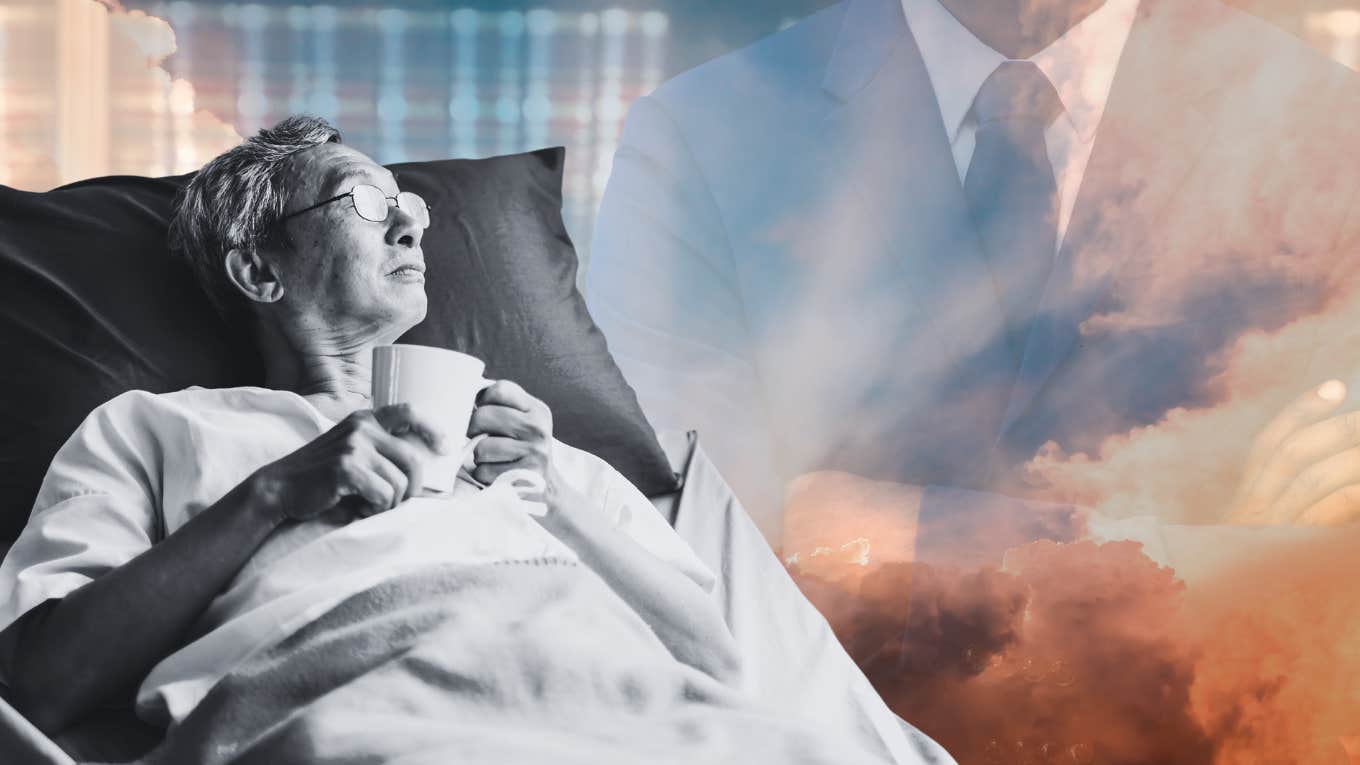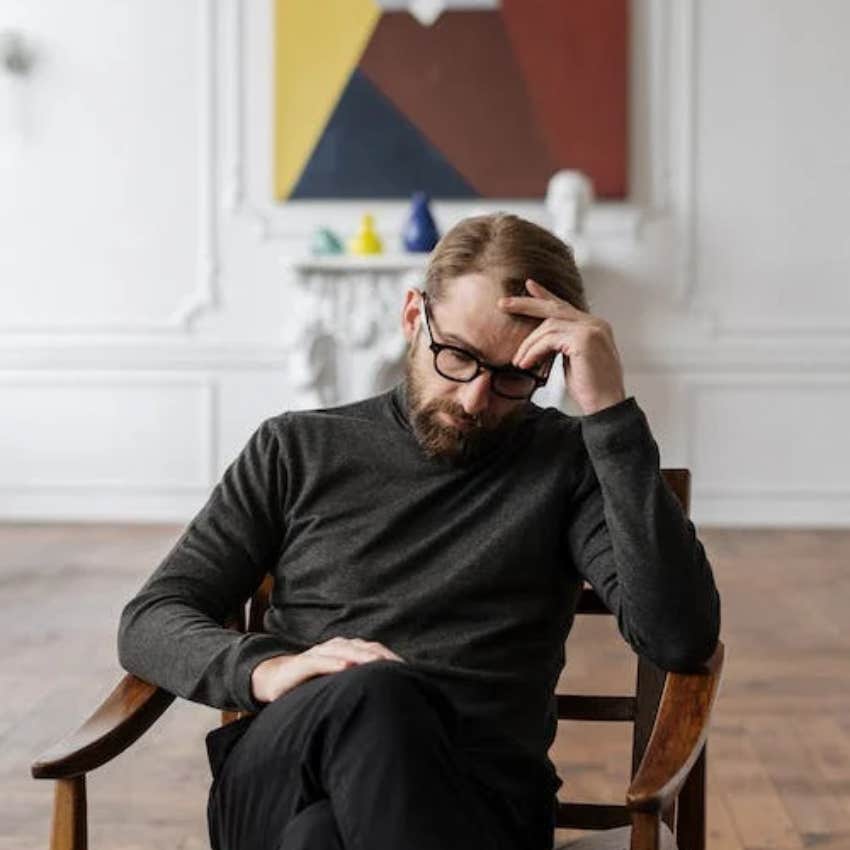The Man Who Showed Me How To Die
I imagined death to be more dramatic.
 Nattakorn Maneerat, cirminalatt, AndreyPopov | Canva
Nattakorn Maneerat, cirminalatt, AndreyPopov | Canva I met Allen at church. He was twenty years my senior and was retiring from the practice of law just as I was getting comfortable in it.
He liked country music, recreational vehicles, and farming. I liked rock 'n roll, electric cars, and cities. So we talked about practicing law. He talked about it because he missed it. I talked about it because I was trying to make a living doing it.
Allen became my mentor in all things spiritual and occupational. I would bring him my problems.
I have a catastrophic mindset.
When I practiced law and was low on cases, I imagined I would never attract another client and would end up in the poorhouse. When I was busy, I imagined that my work would never get done, all my clients would fire me, and I would end up in the poorhouse. I worried about poorhouses the way a 10-year-old boy worries about quicksand. My wife claimed it was because I’d read too much of Dickens.
Amid poorhouse anxiety one day, I went to Allen for advice. He took me out to the cab of his pickup in the church parking lot. There, in an excited and convoluted manner, I explained my fear that my law practice might be incapable of supporting my wife and me in the style to which we had hoped to become accustomed.
Allen listened patiently, and after that pause that all wise mentors take before delivering their wisdom, he said that I should go to work every morning, practice law to the best of my ability, and my money problems would take care of themselves. I considered that the most useless, aphoristic pile of crap I’d ever heard. I wrote Allen off as a human Hallmark Channel. Then, because I couldn’t think of anything else to do or anyone else to go to, I went ahead and did as he suggested. Not long after, my money problem took care of itself.
This scene involving me going to Allen for advice, regretting that I’d even asked, despising him for his Pollyanna answers, and then following the advice anyway, continued for several years with the same results every time.

Photo: Cottonbro Studio/Pexels
In the legal profession, Allen was a personal injury guy.
He was the reason my lawn mower had a warning label saying not to use it as a hedge trimmer. I did probate law. I was a death guy.
In my office, there was death stuff everywhere: Wills, trusts, death certificates, life insurance policies, pension plan transfer documents, probate filings and every other piece of paper one might encounter when it came to death. In my contact list, I had nursing homes, hospice providers, crematoriums, and mortuaries. I was the Google Maps of the bureaucracies that rub against each other when someone dies. When I wrote wills for people, I would stick my card in the black folder I gave them, hoping that their relatives would see it and call me for the probate. The wills were loss leaders. Death was where the money was.
It was hard for my wife to get used to my profession. I would come home and while we discussed the events of the day, I would mention that a certain client of mine had died. When we were first together, she would respond by putting on her sad face. Later in the marriage, she learned to inquire, “So is that good or bad for us?”
Not only did I know the bureaucracies of death, I knew the emotions that surrounded it. I had lived through the deaths of my parents in long-term care. I heard the grief in the voices of the clients who came to see me after the death of a loved one. I saw adult children, on the death of a parent, exhume and resume the rivalries they thought they had buried after adolescence. I saw a death tear families apart and bring families together.
I knew the biology of death — the specific ways in which the most common diseases take us out. I’d read Tuesdays With Morrie, When Breath Becomes Air, and a sizable portion of the pantheon of literature on death. I bought my death collection in hardback and kept it on a special shelf in my office. If the books didn’t provide what I needed, I asked my sister, the doctor, who, after a couple of drinks, would let loose with the unvarnished truth.
So I had the whole death thing down.
Except for one thing.
RELATED: I Meditated On My Fear Of Death And Had A Spectacular Realization
What I didn’t know was, once I could see the end, how was I supposed to fill those last days?
Some people die suddenly, but for most, it is a drawn-out affair. My death would probably be gradual. The doctors would give up trying to save me and switch to palliative care, something that sounds far better to me than having the obsessives who become doctors and nurses rushing around trying to revive me, reconstruct me, and get me ready for a job interview. But when they were gone and the pain meds were doing their job, what was I supposed to do?
Allen was a healthy guy until he wasn’t.
When he was in his late 70s, he suffered a recurrence of a medical issue that had nearly taken him out twenty years earlier. In three months, he went from traveling the United States in his ridiculously large RV to palliative care in his living room. He had a large and supportive family. They surrounded him, as did the people from our spiritual community, all of whom were closer to, more important to, and more useful to Allen than I was.
But he made time for me. He had a hospital bed in the living room. We talked about our cases our travels and the people we knew in common. When I arrived, he would be watching television shows about country music on his big screen television. We would talk and then he would give me the sign that he was getting tired. I would gather my things and would hear him turning the television back on to the country music channel.
I spoke often with his wife. She confirmed that he had taken care of all his legal, religious, and emotional obligations surrounding his exit from this earth and was spending the empty hours he had left with TV shows about his favorite kind of music.
I am not a country music fan. I’m not much of a music fan at all, but I will watch anything that involves humans hitting, kicking, or throwing a ball. Someone once asked me at what point would life no longer be worth living and my instinctual answer was it would be when I could no longer play video games or watch sports. Allen showed me I was on the right track. I had been carrying the burden of thinking my last days should be profound. Allen showed that wasn’t a requirement.
RELATED: I’m Not Scared Of Death, But I Can’t Stop Asking This One Question
Like all the answers Allen gave me, his final one was an answer that I had known all along, but didn’t want to think aloud.
Allen had shown up every day for his profession his family and his church until it was time to stop. I was following in his footsteps. He came to his end among some simple useless pastimes that gave him pleasure, and I intend to do the same.
I live in Oregon. Assisted death is legal and available. In his medicine cabinet, Allen had the cocktail that would end things. When the pain management ceased working and he could no longer listen to his music, he took the ultimate cure.
Judging by the turnout at his funeral, I wasn’t the only person Allen helped along the path of life. I don’t know what he did for others, but the way he died taught me that the simple answers can still be the best.
So should you stop by to chat with me as I approach the end, don’t be surprised to find me camped in my hospital bed next to a bowl of corn chips watching college football. It is the way of dying Allen showed me.
Go Ducks.
RELATED: What My Son's Death Taught Me About Men
Orrin Onken, a retired elder-law lawyer, writes about aging, cooking, and addiction on Medium. His legal mystery novels are available on Amazon.
